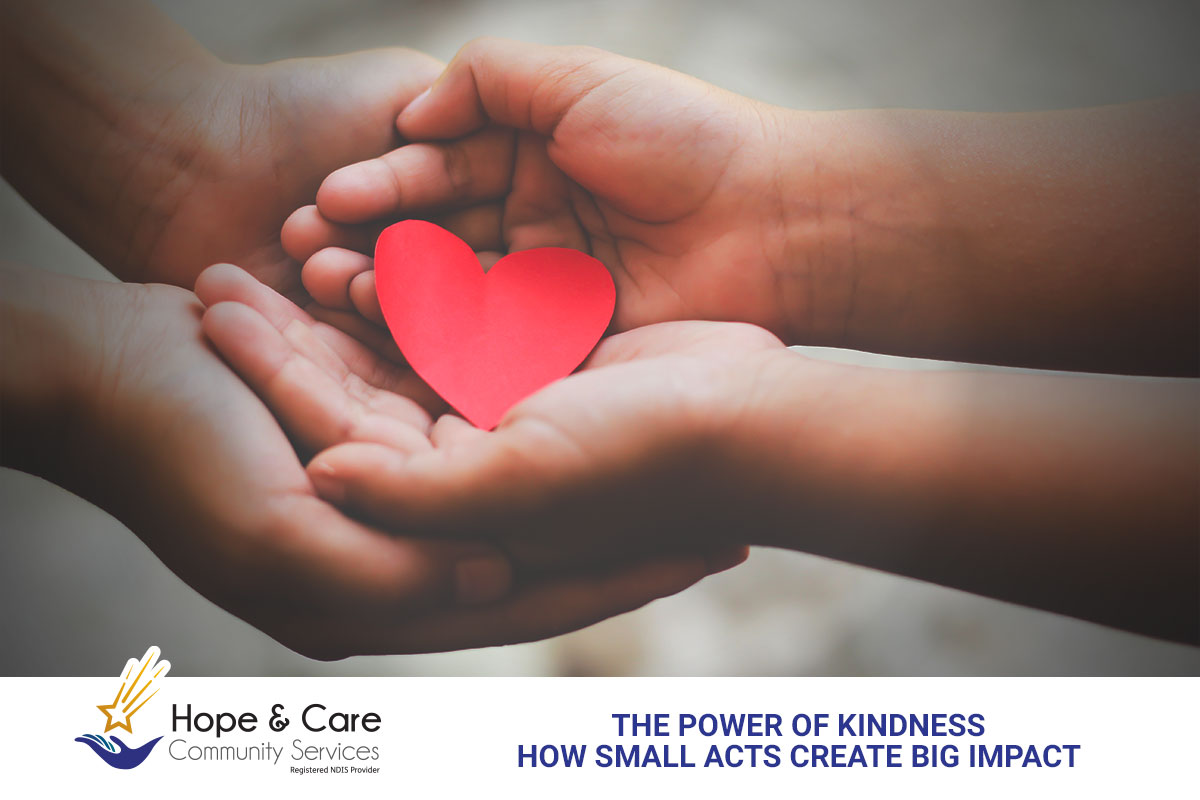
Kindness is a powerful force simple in nature, yet profound in its impact. In the disability support sector, especially within the NDIS (National Disability Insurance Scheme), kindness goes far beyond good manners or friendly gestures. It becomes a tool for building trust, encouraging independence and creating genuinely inclusive communities.
Every day, across NDIS-funded services in Australia, support workers, coordinators, carers and allied health professionals engage in acts of kindness that change lives. Whether it is taking the time to listen, adjusting a care routine to suit individual needs or encouraging someone to step out of their comfort zone, these actions though small create lasting effects.
In this article, we explore how kindness plays a vital role in disability support services, particularly in Queensland and how incorporating it into daily practice can lead to stronger relationships, better participant outcomes and a more inclusive NDIS experience.
What You’ll Learn
- Why kindness is crucial in NDIS support services
- The mental, emotional and social benefits of small kind actions
- How to integrate kindness into daily support work
- How kindness supports person-centred care under the NDIS
- The long-term ripple effect of compassionate care
- How HCCS champions kindness in disability support
Why Kindness Matters in NDIS Disability Support Services
In the context of NDIS disability support, kindness is not just a nicety it is an essential part of delivering safe, effective and person-centred care. It helps build the trust needed between participants and support providers and ensures services are tailored with empathy and understanding.
Enhancing Mental Health and Wellbeing
Kindness creates emotional safety. Many NDIS participants live with complex physical, psychological or emotional needs. When support workers approach tasks with patience, understanding and respect, participants are more likely to engage, communicate and feel empowered in their choices.
Small actions such as:
- Speaking calmly and with reassurance
- Listening without interruption
- Providing extra time for processing or decision-making
can significantly reduce anxiety and build participant confidence.
Strengthening Relationships
In the NDIS space, strong relationships are key to success. Kindness builds positive relationships between support workers and participants, families and service providers and across multi-disciplinary teams.
Support relationships founded on kindness tend to experience:
- Better communication
- Increased mutual respect
- Lower conflict and misunderstandings
- Higher engagement in support plans
These improvements directly contribute to better care outcomes.
Promoting Inclusion and Independence
Kindness also supports inclusive practices, which are essential under the NDIS. Whether it is adapting an activity to be accessible, using communication tools that suit the participant’s needs or simply making time for someone to join at their own pace, these actions show that everyone is valued.
Inclusive kindness helps participants:
- Take part in community and civic activities
- Gain confidence in daily routines
- Express preferences and goals
- Move toward greater independence
How to Practise Kindness in Daily Disability Support Work
Embedding kindness in your professional practice does not require more time or budget it starts with intention and awareness. Here are simple, impactful ways to put kindness into action in NDIS settings:
Be Present and Attentive
Fully engaging with the participant shows that their time, voice and experience matter. Avoid distractions, listen actively and check for understanding. A present support worker encourages honest communication and helps participants feel truly heard.
Use Compassion to Build Trust
Kindness helps establish trust an essential part of delivering effective support coordination or personal care. Whether you are assisting with medication, guiding someone through their SIL routine or working through a plan review, approach every task with patience and empathy.
Recognise and Celebrate Progress
Acknowledge participants for their efforts, whether big or small. This could mean praising someone for completing a goal, attending a community event or simply trying something new. Celebrating wins no matter how modest fosters positivity and motivation.
Adjust and Include Intentionally
Kindness is also about recognising and meeting people where they are. Modify language, adapt the physical environment or restructure activities to ensure full participation. Inclusion is more than accessibility it is about belonging.
The Ripple Effect in NDIS Communities
Kindness spreads. One supportive gesture can influence an entire team, community or household. In shared NDIS housing or during community programs, this ripple effect leads to more respectful interactions, improved peer relationships and stronger social skills.
For support workers, this means:
- Less stress and more rewarding relationships
- Better teamwork and workplace satisfaction
- A culture of care that benefits everyone
For participants, it means:
- Increased social engagement
- Better mental health and resilience
- A higher likelihood of reaching their NDIS goals
Make Kindness a Daily Habit in Disability Support
Kindness is not a single act it is a professional approach. In the disability support sector and especially under the NDIS, kindness plays a critical role in building services that empower, uplift and include.
Whether you are delivering personal care, providing support coordination, helping someone transition into Supported Independent Living (SIL) or managing an NDIS plan, your kind actions contribute to:
- Greater independence for participants
- Safer and more inclusive environments
- Higher-quality, relationship-based support
By leading with kindness, we can ensure the NDIS delivers not just services but outcomes that truly reflect each person’s dignity, value and right to a full life.
About Hope & Care Community Services (HCCS)
Hope & Care Community Services (HCCS) is a registered NDIS provider in Queensland, dedicated to delivering compassionate, person-centred disability support across the state. We believe that kindness, respect and inclusion are essential to effective support and we integrate these values into everything we do.
At HCCS, we do not just provide support we build relationships. Our team takes the time to understand every participant’s goals, preferences and support needs to deliver meaningful, respectful care. With a commitment to professionalism and compassion, we help participants live more connected, independent and empowered lives one kind act at a time.
Want to learn more? Read other articles :
- Goal Setting for Teenagers and Young Adults
- Who’s Who: The Key Terms of Your NDIS Plan
- Positive Behaviour Support under the NDIS: A Guide
HCCS is a registered NDIS provider. Learn more about our services.
♥ We are available in Brisbane! – Our team is just a call away!
